Breaking up is a tough thing to do. Sometimes, it feels like it continues forever.......hours ...days...weeks...months...millions of years???? Well, just ask Pangaea !
Hello and welcome back to the emotional episode of Imagicnation ! A place where we will find out the answers to some of the most interesting & curious questions related to science...
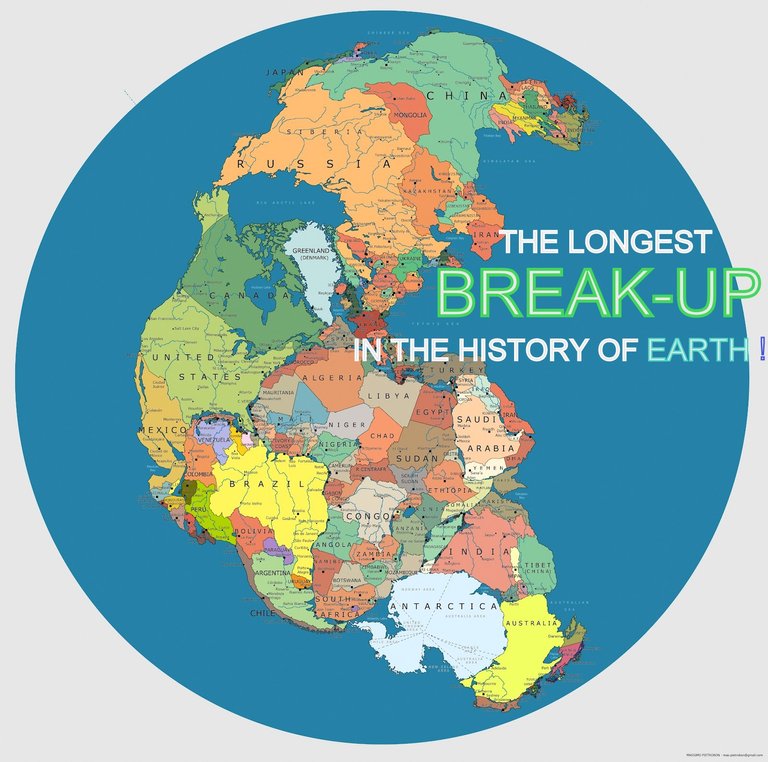
Hey guys…Did you ever have a break up with your loved ones ?? It’s ok…you don’t need to share it with me…I too had ! I just wanted to say that today I will be telling you about one of most emotional part of our planet Earth: Tectonics Plates…I mean how they got separated !! So, here you go…
Plate tectonics !!
It’s not your mistake if you take it for granite. The concept that the Earth’s crust moves around, rubs together, and pulls apart seems understandable now. I mean just have a look at it. But as recently as 50 years ago, thinking the continents had ever actually moved from their present locations would have gotten you laughed out of any serious scientific meeting. The concept of moving continents all started with Alfred Wegener. He noticed the continents seemed to fit together, almost perfectly, like a jigsaw puzzle. And if they used to fit together, that means they must have moved apart in some way. This led him to introduce a new concept: “continental drift”.
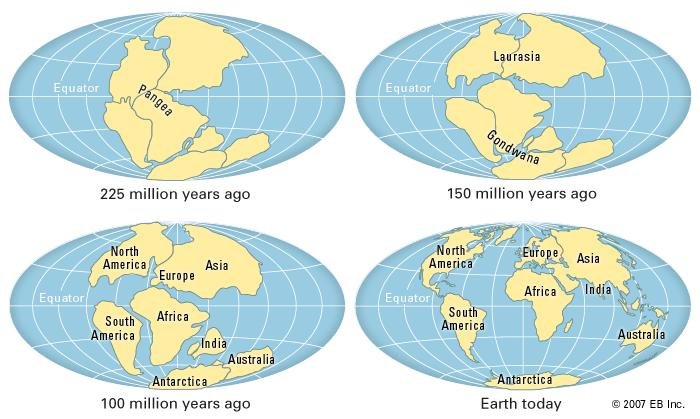
The comfortable fit of coastlines wasn't the only evidence that the continents were all once joined together in a giant landmass, all nice and cool Wegener noticed fossils of certain animals had been found in Africa, India, and Antarctica. How did the same animal die all over the world? Before, geologists thought land bridges had joined the continents, and were now submerged or eroded away. Or else, they swam ! Remnants of an ancient fern had also been found on FIVE continents. And ferns certainly can’t swim. It just didn’t make logic. That wasn’t all. The similar types of rocks and mountains lined up continuously between continents. It was a convincing body of evidence signifying the continents moved around during Earth’s history, so obviously Wegener was celebrated and awarded for this brilliant idea, right? Not exactly.
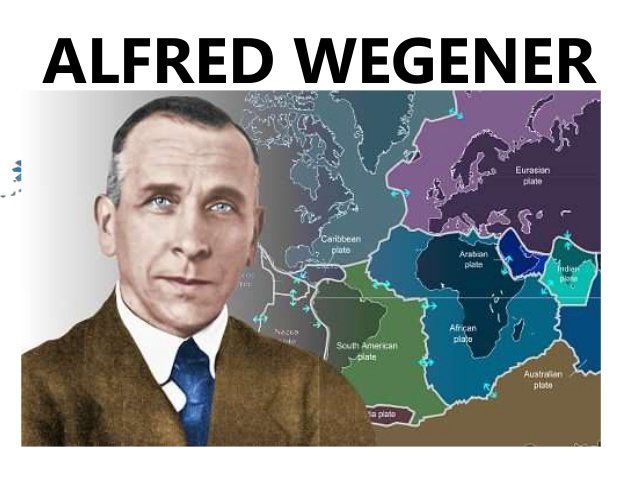
One paleontologist termed his theory “Germanic pseudoscience”. He was teased around the world for his “delirious ravings.” The reason for all the hate was no one could actually watch HOW continents might move. Did the rotation of the Earth generate enough centrifugal force to move them? Or was it the tides?? These forces weren’t quite strong to move entire continents. Wegener was never able to convince other scientists before he died on a trip to Greenland in 1930 at only 50 years old. He never knew the destiny of his ideas. In 1929, Arthur Holmes showed thermal convection in the mantle could create sufficient current to move the continental crust on top of it, a clue he originally got from Wegener.
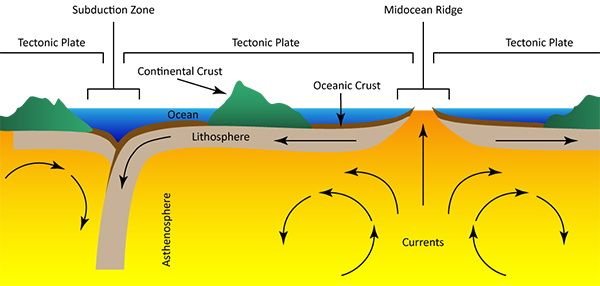
In 1962, geologist Harry Hess found a weird magnetic pattern along a seafloor ridge. Earth’s magnetic field has reversed hundreds of time over the planet’s history. Magnetic minerals deep in the Earth, in hot magma, preserved this magnetic fingerprint as they cooled and toughened into rock. Just like planetary tree rings, geologists could study the rock on either side of the ridge to retrace its history.
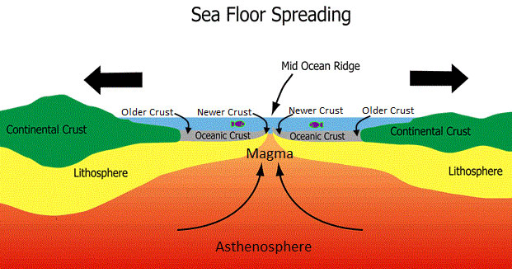
The seafloor was spreading apart at these ridges, where new rock was emerging up from the hot mantle. Geologists finally had evidence that earth’s crust wasn’t static. It was constantly fluctuating. Are they even moving right now? Can’t you just tell? Probably not!
Every year, the spreading at the Mid-Atlantic ridge pushes the Eurasian plate and North American plate just 2.5 centimeters farther apart, but over millions of years, that really sums up. Spreading between plates also occurs on land. The African plate and the Arabian plate are actually, separating the continent in two. These deep rift valleys will eventually become an ocean and form a new, separate African landmass.
The “Ring of Fire” is where denser oceanic crust is moving beneath the less dense continental crust.
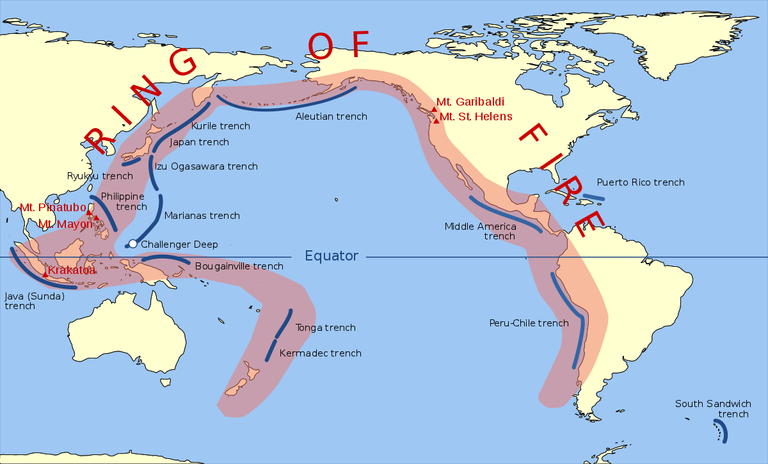 (Picture from Wikipedia)
(Picture from Wikipedia)90% of the world’s earthquakes and most major volcanoes lie along this margin. Monstrous eruptions and destructive earthquakes change our world everyday and affect the lives of humans all over it.
So, just like the surface of our dynamic planet, the story of plate tectonics tells us it can take a little while before earth-shaking ideas change the world… if you catch my drift !!
That’s all for today guys…
Hope you liked it…
If you did, please feel free to drop your comments below…
References used :

1) https://en.wikipedia.org/wiki/Plate_tectonics
2) https://www.britannica.com/science/continental-drift-geology
Last six science episodes :
1) Imagicnation #07 | Engines of Catastrophe : The Science of Hurricanes !!
2) Imagicnation #06 | Do Plants THINK ??
3) Imagicnation #06 | What's the deadliest animal of the world ??
4) Imagicnation #05 | Why Does Time Move Forward?
5) Imagicnation #04 | How Do Bees Manufacture Honey??
6) Imagicnation #03 | Bioluminescence : Nature's living light-shows !!

Fun title you used with breakup! I am including in upvotable 32 because of the comment in Upvotable 31!
thank you @jerrybanfield sir ...it's really inspiring... :)
Will be working my best in future days
Keep blessing...
Thanx @jerrybanfield :)
-@splendorhub
Congratulations @imagicnation! You have completed some achievement on Steemit and have been rewarded with new badge(s) :
Click on any badge to view your own Board of Honor on SteemitBoard.
For more information about SteemitBoard, click here
If you no longer want to receive notifications, reply to this comment with the word
STOPGreat post! Lets also keep in mind the significant importance the magnetic fields have in the role of volcanoes and earthquakes. :) Thank you for sharing.
@splendorhub
yes of course...anyway, thank you :)